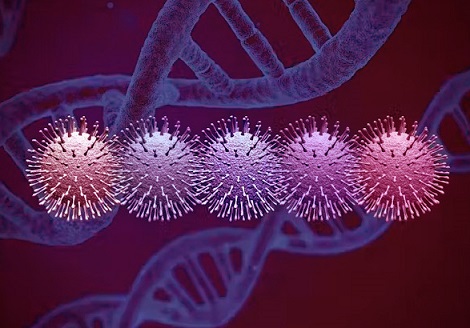German Study Finds That Emerging COVID-19 Variants Show Strong Resistance to Antibodies and Heightened Cell Entry
Nikhil Prasad Fact checked by:Thailand Medical News Team Nov 01, 2024 5 months, 1 week, 6 days, 11 hours, 32 minutes ago
Medical News: Researchers from top German research institutions have conducted an in-depth analysis of the latest SARS-CoV-2 variants, KP.2, KP.2.3, KP.3, and LB.1, uncovering a powerful potential for these lineages to evade antibodies generated by previous infections and vaccines. This study highlights how these variants have evolved to increase their efficiency in entering human cells and avoiding immune defenses.
 German Study Finds That Emerging COVID-19 Variants Show Strong Resistance to
German Study Finds That Emerging COVID-19 Variants Show Strong Resistance to
Antibodies and Heightened Cell Entry
The research team includes experts from the German Primate Center–Leibniz Institute for Primate Research, Georg-August-University Göttingen, Friedrich-Alexander University of Erlangen-Nürnberg, Hannover Medical School, and the German Centre for Infection Research.
Higher Efficiency in Host Cell Entry
The study used pseudotyped particles to analyze how efficiently these variants could enter various human cells. This
Medical News report delves into findings that KP.2, KP.2.3, KP.3, and LB.1 have shown high adaptability, demonstrating that the mutations in these strains allow them to enter cells at higher or comparable rates to the JN.1 strain, which had previously dominated global COVID-19 cases. Among these variants, KP.3 showed the highest entry efficiency into lung cells, especially Calu-3 lung cells, a type of human cell particularly vulnerable to severe infection.
Different Ways of Utilizing ACE2 Receptors
The researchers noted subtle differences in how these variants bind to the ACE2 receptor, the main protein SARS-CoV-2 uses to enter human cells. KP.2, for example, was capable of using both human and murine ACE2 receptors effectively, whereas KP.2.3 and LB.1 did not. This specificity might influence which animals, aside from humans, could be susceptible to infections with these variants, which could have implications for cross-species transmissions in the future.
Antibody Resistance: A Major Concern
One of the most concerning findings is that the variants KP.2, KP.2.3, KP.3, and LB.1 are highly resistant to antibody neutralization. The study tested several monoclonal antibodies, and only one, BD55-5514, managed to effectively neutralize all the variants. Others, such as BD56-1854 and Omi-42, displayed significantly reduced efficacy, highlighting a gap in the current antibody treatments available. This breakthrough discovery shows that these newer variants may be harder to neutralize even with existing therapeutic options, particularly for individuals who have not achieved “hybrid immunity” through both infection and vaccination.
Reduced Efficiency in Cell Fusion
Interestingly, the researchers also found that KP.2, KP.2.3, KP.3, and LB.1 variants led to less cell-to-cell fusion compared to the JN.1 strain. Cell fusion is a process where infected cells merge with neighboring healthy cells, contributing to the spread of the virus within the bo
dy. The lower fusion potential may imply a difference in how the virus spreads within the host but does not detract from its overall infectivity or immune evasion.
How These Variants Compare Globally
The study revealed that the older JN.1 variant is losing its prevalence worldwide, as KP.2, KP.2.3, and KP.3 become more common, indicating that these variants' unique mutations may help them spread more effectively. These findings are based on data gathered from samples between April and July 2024, which showed an upward trend for these newer lineages in several regions.
Key Mutations in Spike Proteins
Researchers examined mutations in the spike (S) protein of these variants, which allow them to bind more effectively to receptors on human cells and evade immune detection. The mutations, including R346T and F456L, play a significant role in enabling antibody resistance. The study also explored how these mutations impact the virus's ability to evade antibodies generated by the latest vaccine boosters adapted to the XBB.1.5 lineage, widely administered in response to earlier Omicron waves.
Conclusions
This study suggests that the adaptability of SARS-CoV-2 continues to challenge both natural and vaccine-induced immunity. The KP.2, KP.2.3, KP.3, and LB.1 variants pose an increased risk of infection due to their heightened cell entry efficiency and notable antibody resistance. The variations in ACE2 receptor usage could also indicate potential shifts in cross-species transmission risk. As current therapeutic monoclonal antibodies show limited efficacy against these new variants, the findings underscore the critical need for broad-spectrum antibodies and vaccines that can address this rapid viral evolution.
The study findings were published in the peer-reviewed journal: Vaccines.
https://www.mdpi.com/2076-393X/12/11/1236
For the latest COVID-19 News, keep on logging to Thailand
Medical News.
Read Also:
https://www.thailandmedical.news/news/new-recombinant-sars-cov-2-variant-xek-likely-to-be-the-next-predominant-strain-by-late-winter-superseding-xec
https://www.thailandmedical.news/news/sars-cov-2-xec-variant-shows-enhanced-immune-evasion-through-ntd-glycosylation
